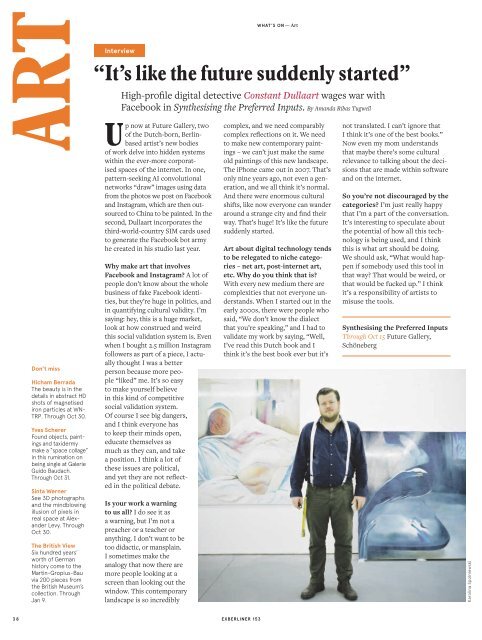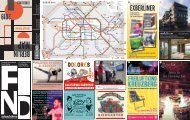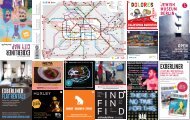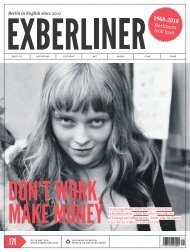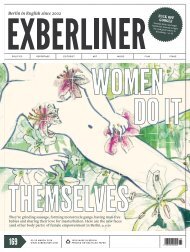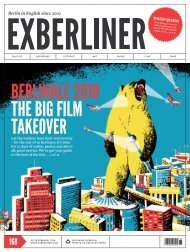EXBERLINER Issue 153, October 2016
You also want an ePaper? Increase the reach of your titles
YUMPU automatically turns print PDFs into web optimized ePapers that Google loves.
WHAT’S ON — Art<br />
Interview<br />
“It’s like the future suddenly started”<br />
High-profile digital detective Constant Dullaart wages war with<br />
Facebook in Synthesising the Preferred Inputs. By Amanda Ribas Tugwell<br />
Don’t miss<br />
Hicham Berrada<br />
The beauty is in the<br />
details in abstract HD<br />
shots of magnetised<br />
iron particles at WN-<br />
TRP. Through Oct 30.<br />
Yves Scherer<br />
Found objects, paintings<br />
and taxidermy<br />
make a “space collage”<br />
in this rumination on<br />
being single at Galerie<br />
Guido Baudach.<br />
Through Oct 31.<br />
Sinta Werner<br />
See 3D photographs<br />
and the mindblowing<br />
illusion of pixels in<br />
real space at Alexander<br />
Levy. Through<br />
Oct 30.<br />
The British View<br />
Six hundred years’<br />
worth of German<br />
history come to the<br />
Martin-Gropius-Bau<br />
via 200 pieces from<br />
the British Museum’s<br />
collection. Through<br />
Jan 9.<br />
Up now at Future Gallery, two<br />
of the Dutch-born, Berlinbased<br />
artist’s new bodies<br />
of work delve into hidden systems<br />
within the ever-more corporatised<br />
spaces of the internet. In one,<br />
pattern-seeking AI convolutional<br />
networks “draw” images using data<br />
from the photos we post on Facebook<br />
and Instagram, which are then outsourced<br />
to China to be painted. In the<br />
second, Dullaart incorporates the<br />
third-world-country SIM cards used<br />
to generate the Facebook bot army<br />
he created in his studio last year.<br />
Why make art that involves<br />
Facebook and Instagram? A lot of<br />
people don’t know about the whole<br />
business of fake Facebook identities,<br />
but they’re huge in politics, and<br />
in quantifying cultural validity. I’m<br />
saying: hey, this is a huge market,<br />
look at how construed and weird<br />
this social validation system is. Even<br />
when I bought 2.5 million Instagram<br />
followers as part of a piece, I actually<br />
thought I was a better<br />
person because more people<br />
“liked” me. It’s so easy<br />
to make yourself believe<br />
in this kind of competitive<br />
social validation system.<br />
Of course I see big dangers,<br />
and I think everyone has<br />
to keep their minds open,<br />
educate themselves as<br />
much as they can, and take<br />
a position. I think a lot of<br />
these issues are political,<br />
and yet they are not reflected<br />
in the political debate.<br />
Is your work a warning<br />
to us all? I do see it as<br />
a warning, but I’m not a<br />
preacher or a teacher or<br />
anything. I don’t want to be<br />
too didactic, or mansplain.<br />
I sometimes make the<br />
analogy that now there are<br />
more people looking at a<br />
screen than looking out the<br />
window. This contemporary<br />
landscape is so incredibly<br />
complex, and we need comparably<br />
complex reflections on it. We need<br />
to make new contemporary paintings<br />
– we can’t just make the same<br />
old paintings of this new landscape.<br />
The iPhone came out in 2007. That’s<br />
only nine years ago, not even a generation,<br />
and we all think it’s normal.<br />
And there were enormous cultural<br />
shifts, like now everyone can wander<br />
around a strange city and find their<br />
way. That’s huge! It’s like the future<br />
suddenly started.<br />
Art about digital technology tends<br />
to be relegated to niche categories<br />
– net art, post-internet art,<br />
etc. Why do you think that is?<br />
With every new medium there are<br />
complexities that not everyone understands.<br />
When I started out in the<br />
early 2000s, there were people who<br />
said, “We don’t know the dialect<br />
that you’re speaking,” and I had to<br />
validate my work by saying, “Well,<br />
I’ve read this Dutch book and I<br />
think it’s the best book ever but it’s<br />
not translated. I can’t ignore that<br />
I think it’s one of the best books.”<br />
Now even my mom understands<br />
that maybe there’s some cultural<br />
relevance to talking about the decisions<br />
that are made within software<br />
and on the internet.<br />
So you’re not discouraged by the<br />
categories? I’m just really happy<br />
that I’m a part of the conversation.<br />
It’s interesting to speculate about<br />
the potential of how all this technology<br />
is being used, and I think<br />
this is what art should be doing.<br />
We should ask, “What would happen<br />
if somebody used this tool in<br />
that way? That would be weird, or<br />
that would be fucked up.” I think<br />
it’s a responsibility of artists to<br />
misuse the tools.<br />
Synthesising the Preferred Inputs<br />
Through Oct 15 Future Gallery,<br />
Schöneberg<br />
Karolina Spolniewski<br />
38<br />
<strong>EXBERLINER</strong> <strong>153</strong>


